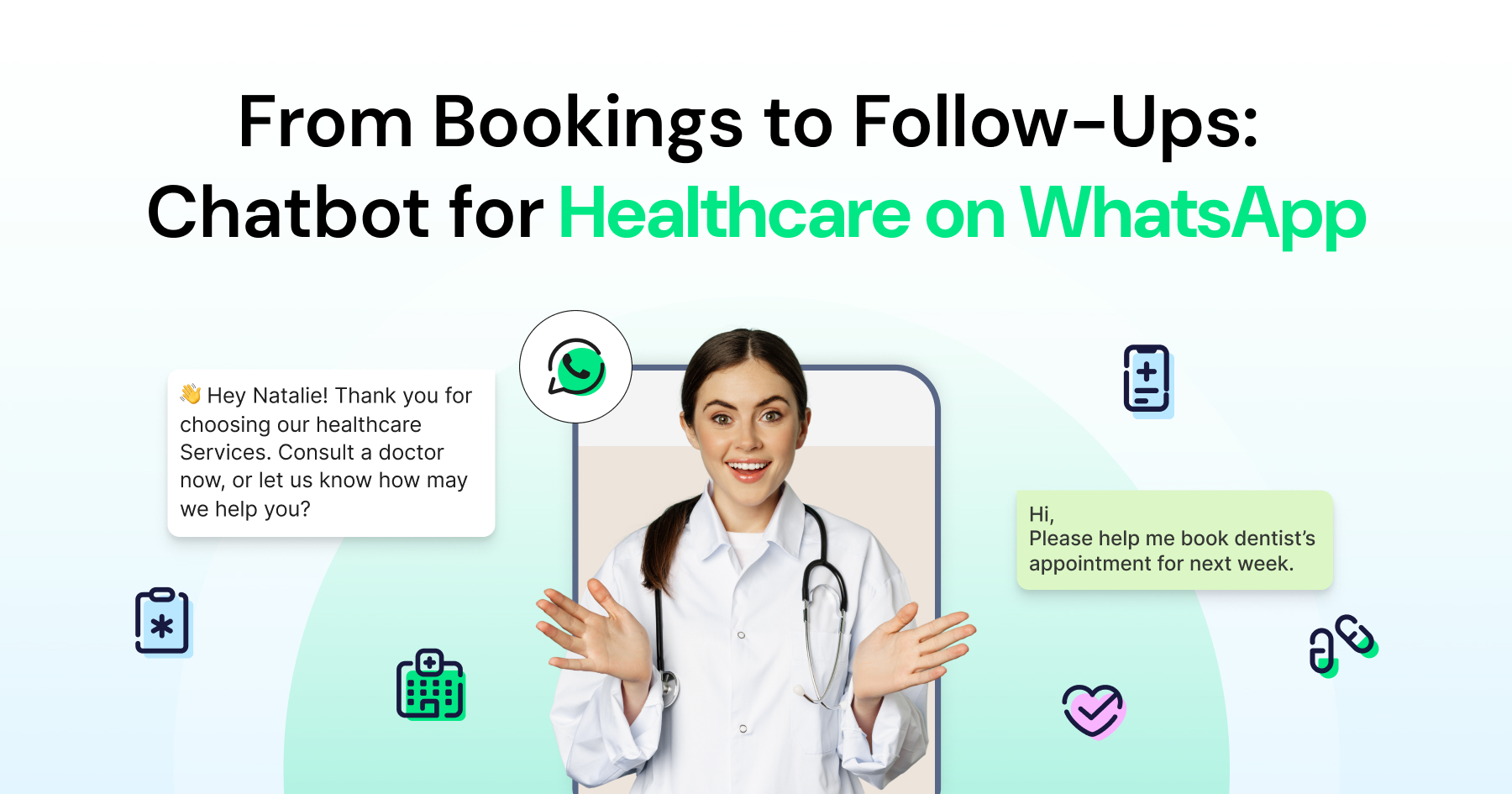
Chatbot for Healthcare: Driving Patient-Centric Care Through WhatsApp Automation
Written by:
 Ashwin
|
on:
October 1, 2025
|
Last updated on:
February 9, 2026
|
According to: Editorial Policies
Ashwin
|
on:
October 1, 2025
|
Last updated on:
February 9, 2026
|
According to: Editorial Policies
Too Long? Read This First
- Healthcare providers face rising patient volumes, staff shortages, and demand for 24/7 availability. WhatsApp chatbots help close this gap.
- Chatbots automate repetitive tasks like appointment booking, reminders, FAQs, triage, and lab report delivery, reducing errors and admin load.
- Patients benefit from 24/7 support, personalized reminders, faster triage, and proactive care experiences.
- Real-world impact: Rockethealth cut response times by 97%; C-MER achieved 61% more enquiries and 763+ average monthly bookings.
- Key challenges include data privacy, system integration, and adoption resistance, all solvable with platforms like Wati.
The healthcare sector is under constant pressure with growing patient volumes, staff shortages, and the rising expectation of round-the-clock availability. Traditional systems cannot keep up.
That is why forward-thinking hospitals and health-tech providers are deploying chatbots for healthcare to reimagine patient engagement.
This is not just about answering FAQs. With the right platform, a chatbot for healthcare can reduce administrative bottlenecks, improve patient satisfaction scores, and deliver measurable operational efficiency.
When embedded directly on WhatsApp, the world’s most used messaging app, adoption becomes seamless.
Why Healthcare Leaders are Prioritizing Chatbots?
Patients today expect the same convenience from hospitals as they do from consumer apps: instant, personalized, and accessible care.

For healthcare providers, this translates into four priorities:
Driving Operational Efficiency
Every hospital call center spends hours handling repetitive tasks: appointment booking, FAQs, billing queries, and test report follow-ups. Automating these with chatbots:
- Cuts average handling time significantly.
- Lowers the load on the front desk and nursing staff.
- Reduces errors caused by manual data entry.
For example, Rockethealth, a digital health platform in India, faced growing patient queries across consultations, billing, and medication support.

By deploying a WhatsApp chatbot with Wati, they achieved a 97% reduction in response time, enabled faster triage for critical cases, and lowered staff workload on non-urgent queries. This allowed medical teams to focus more on clinical care while automation handled administrative communication.
In fact, a 2024 review by the Journal of Medical Internet Research found that chatbots helped reduce 48% of administrative or financial burdens in healthcare systems.
This shows how automation is not just a patient convenience but a systemic efficiency driver.
Enabling Patient-Centric Care
Modern patients expect healthcare to mirror their consumer experiences: instant, digital, and personalized. Chatbots deliver:
- 24/7 support so patients can get help outside of working hours.
- Personalized health reminders for medications, lab visits, or wellness check-ins.
- Accessible triage tools that guide patients to the right care pathway.
This shifts the patient experience from reactive to proactive care.
Example: C-MER Medical Holdings, a Hong Kong–based healthcare group specializing in ophthalmic services, implemented Wati’s WhatsApp solution to improve patient engagement.

They achieved a 61% increase in enquiries at their refractive center, maintained an 84%+ conversion rate in their OPD unit, and averaged 763 bookings monthly in their CKJ unit.
The result was more consistent communication and higher patient satisfaction across units.
Scaling Without Headcount
Healthcare systems cannot scale staff linearly with patient demand. Chatbots can manage thousands of conversations simultaneously. They absorb spikes in queries during vaccination drives, seasonal flu waves, or public health campaigns, while routing urgent cases to human teams.
Despite this, adoption is still early. Only 19 percent of medical group practices currently use a chatbot or virtual assistant for patient communication. This creates a competitive edge for early adopters who move quickly.
Advanced Use Cases of Chatbots in Healthcare
With the right setup, a chatbot for healthcare can do much more than answer FAQs.
These advanced use cases show how automation supports both patients and healthcare teams across critical touchpoints.
Intelligent Appointment Management
Appointment booking is one of the most time-consuming tasks for front-desk staff. A chatbot integrated with the hospital CRM can:
- Allow patients to book, reschedule, or cancel appointments instantly through WhatsApp or the hospital website.
- Send reminders with directions and preparation instructions (for example, “ fasting for 8 to 12 hours before your blood test”)

- Reduce no-shows by issuing confirmation prompts and easy reschedule options.
- Sync data back to the hospital system in real time to keep schedules accurate.
Expected Impact: Clinics that implement chatbot-based scheduling can lower no-show rates and reduce call center workload, while patients appreciate the convenience of self-service.
Medication and Treatment Adherence
Medication adherence is one of the biggest challenges in chronic care. WhatsApp Chatbots can
- Send personalized reminders at prescribed times.

- Offer clear dosage instructions with images or short videos.
- Trigger refill alerts before a prescription runs out.
- Escalate to care teams if multiple reminders are missed.
Expected Impact: Automated reminders can improve adherence rates, especially in long-term therapies like diabetes, hypertension, or oncology treatment, where missed doses can lead to health complications.
Triage and Symptom Assessment
AI-powered chatbots are becoming effective triage tools. Patients can input their symptoms, and the chatbot asks follow-up questions to narrow down possible conditions.

It can then recommend whether to seek emergency care, book a consultation, or manage symptoms at home.
Recent research testing AI chatbots with 400 clinical vignettes showed 81.8% top-1 diagnostic accuracy and 85% top-2 accuracy, while requiring 47% fewer questions than traditional symptom checkers.
This demonstrates how advanced chatbots can speed up triage while maintaining high levels of accuracy.
Lab Reports and Test Results Delivery
Patients often struggle to access reports or understand the results. WhatsApp chatbots can:
- Deliver lab results securely via WhatsApp.
- Provide simple explanations of test values and ranges.
- Suggest next steps, such as scheduling a follow-up with a specialist.
- Allow patients to ask clarifying questions without overloading call centers.
Expected Impact: Faster access to results improves patient satisfaction and reduces anxiety. Hospitals reduce inbound queries while ensuring follow-up care happens on time.
Public Health Campaigns and Population Outreach
Beyond one-to-one interactions, chatbots can be used at scale to manage public health campaigns:
- Broadcast vaccination reminders during flu season.
- Deliver educational material during health awareness drives.

- Screen large populations with pre-consultation surveys.
- Collect data for epidemiological tracking.
Expected Impact: Governments and large healthcare networks can reach millions of people instantly without adding staff, while ensuring messages are consistent and accessible.
Practical Solutions to Healthcare Chatbot Challenges
While the benefits of a chatbot for healthcare are significant, leaders also face challenges during adoption. Addressing these upfront ensures smoother implementation and long-term success.
Data Privacy and Compliance
The Challenge: Patient data is sensitive, and mishandling it can lead to regulatory issues. Healthcare organizations need to comply with HIPAA, GDPR, and local health data laws.
The Solution: Use platforms built on the official WhatsApp Business API that offer end-to-end encryption, role-based access, and audit logs. Partnering with vendors like Wati ensures compliance is baked into the infrastructure.
Integration with Legacy Systems
The Challenge: Many hospitals run on legacy EMRs or siloed CRMs that are not integration-friendly. Without integration, chatbot automation loses efficiency.
The Solution: Choose chatbot platforms that provide API integrations that can connect with hospital management systems, CRMs, and third-party scheduling tools to deliver seamless workflows.
Balancing Automation and Human Touch
The Challenge: Patients can get frustrated if chatbots feel too rigid or fail to escalate urgent cases. Over-reliance on automation risks eroding trust.
The Solution: Design hybrid workflows where chatbots handle FAQs, scheduling, and reminders, while complex cases are routed to human staff. AI-powered routing ensures patients get the right level of support without bottlenecks.
Adoption Resistance from Staff or Patients
The Challenge: Staff may be hesitant to trust automation, and older patients may resist digital interactions.
The Solution: Provide training and phased rollouts for staff, showing how chatbots free up time for clinical care. For patients, deploy chatbots on familiar channels like WhatsApp rather than asking them to download a new app.
Measuring ROI
The Challenge: Without clear KPIs, chatbot projects risk being seen as “tech experiments” rather than business-critical tools.
The Solution: Track metrics such as reduction in response time, decrease in call center volume, increase in appointment bookings, and patient satisfaction scores
Why WhatsApp is the Best Channel for Healthcare Chatbots?
While chatbots can exist on websites or apps, adoption is the biggest hurdle. Patients do not want to download another app or remember another login.
WhatsApp solves this challenge:
- 2.7 billion users globally – Your patients are already here.
- Frictionless onboarding – No app downloads and no training required.
- Rich media support – Share prescriptions, reports, or care instructions with images, PDFs, and videos.
- End-to-end encryption – Patient confidentiality remains intact.
Despite clear benefits, only 19% of medical group practices currently use a chatbot or virtual assistant for patient communication.
This means most providers still rely on outdated methods, while a few early adopters are already building stronger patient relationships at scale.
When powered by a healthcare-ready automation platform like Wati, WhatsApp chatbots become more than a support tool. They act as an always-on digital health companion.
Why Healthcare Providers Choose Wati?
Unlike generic chatbot builders, Wati is built on the official WhatsApp Business API with compliance, scalability, and healthcare-specific workflows in mind.
- No-code Automation: Deploy patient journeys without technical teams
- AI Agents: Intelligent routing for complex patient needs
- Scalable Campaigns: Manage appointment reminders, vaccination drives, or wellness initiatives at a population scale
The direction of healthcare is clear. As Gary Fritz, VP & Chief of Applications at Stanford Health Care, says, “All the applications in our portfolio will ultimately have an AI model.
It’s inevitable. Predictive models can help inform physicians and reduce their cognitive burden, which is transformative for wellness and quality of care.”

This helps frame chatbots as part of a larger AI shift in healthcare.
The Future of Patient Engagement Starts With a Chatbot for Healthcare
Healthcare leaders can no longer afford to treat chatbots as optional add-ons. They are mission-critical infrastructure for modern patient engagement.
A chatbot for healthcare, especially when deployed on WhatsApp, bridges the gap between patient expectations and provider capacity. The result is faster care delivery, improved patient satisfaction, and operational resilience.
If you are ready to elevate your patient engagement strategy, book a demo with Wati today and see how healthcare chatbots can transform your care delivery model.
Frequently Asked Questions
A healthcare chatbot is an AI-powered virtual assistant that helps patients and providers communicate in real time. It can manage tasks such as appointment booking, symptom triage, prescription reminders, and billing queries.
Chatbots provide 24/7 support, reduce wait times, and deliver personalized reminders or health guidance. This ensures patients receive timely care while reducing the administrative burden on doctors and hospital staff.
Yes. When built on secure platforms such as the official WhatsApp Business API, healthcare chatbots use end-to-end encryption and can be configured to align with data protection standards such as HIPAA and GDPR.
Modern chatbot platforms like Wati integrate seamlessly with EMRs, CRMs, and hospital management systems. This allows for automated appointment syncing, secure patient record updates, and streamlined workflows.
You can implement a healthcare chatbot by partnering with a platform like Wati. With no-code automation, pre-built healthcare workflows, and API integrations, deployment is quick and scalable.



